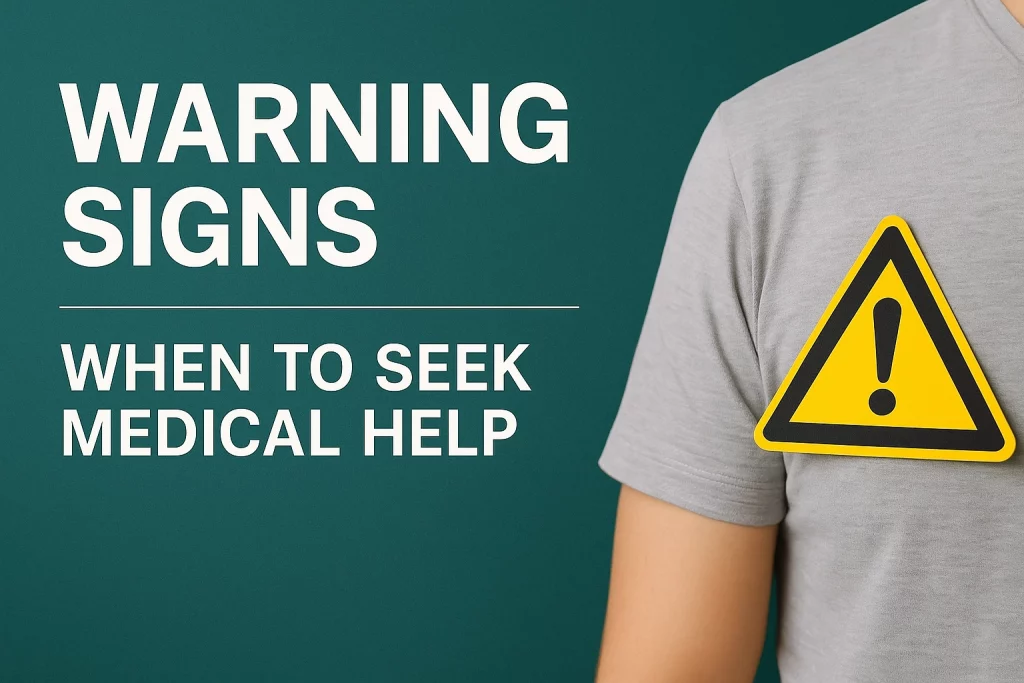How to Know When a Symptom Is Serious: A Guide to Common Warning Signs
Everyone experiences the occasional headache, stomach upset, or strange ache now and then. But how do you know when a symptom is something minor or a sign that something more serious could be going on?
Understanding what your body is trying to tell you is one of the most important steps you can take for your health. This guide highlights common symptoms that could indicate a more serious issue and what they might mean.
1. Chest Pain
Chest pain isn’t always heart-related, but it should never be ignored.
Take it seriously if:
- It feels like pressure, squeezing, or tightness in the chest
- Pain spreads to your jaw, arm, or back
- You feel short of breath, lightheaded, or nauseous
These could be signs of a heart attack or a serious heart condition.
2. Sudden or Unexplained Weight Loss
Losing weight without trying can seem like a bonus, but it’s often a sign of an underlying condition.
Possible causes include:
- Thyroid disorders
- Diabetes
- Chronic infections
- Digestive disorders like Crohn’s disease
- Certain types of cancer
Track your weight and speak to a healthcare provider if the loss is 5% or more of your body weight in a few months.
3. Persistent Fatigue
Tiredness is common, but fatigue that doesn’t improve with rest could be a red flag.
Could be related to:
- Anaemia
- Thyroid dysfunction
- Sleep disorders
- Mental health concerns like depression
- Autoimmune conditions
Don’t dismiss fatigue if it’s ongoing or affecting your daily life.
4. Blood in Your Stool or Urine
Seeing blood in the toilet can be frightening, and it should never be ignored.
Common causes include:
- Haemorrhoids or anal fissures
- Urinary tract infections (UTIs)
- Kidney stones
- More serious issues like bowel or bladder cancer
Even if you only notice it once, it’s worth getting checked.
5. Shortness of Breath
Struggling to breathe after exercise is normal. But breathlessness at rest, or after minimal activity, may be a sign of:
- Asthma or COPD
- Heart conditions
- Blood clots (including pulmonary embolism)
- Infections like pneumonia
If you ever feel breathless and can’t explain why, it needs urgent attention.
6. New or Changing Lumps
A lump anywhere on the body should be checked, especially if:
- It’s hard or doesn’t move easily under the skin
- It’s growing in size
- It’s painful or tender
- It changes colour or bleeds
Most lumps are harmless, but some may be cysts, infections, or in rare cases, cancerous.
7. Severe Headaches
Most headaches are nothing to worry about. But some may need urgent care.
Seek help if:
- It’s the worst headache you’ve ever had
- It came on suddenly or while sleeping
- You have vision changes, weakness, or confusion
These could be signs of a stroke, aneurysm, or high blood pressure.
8. Changes in Vision
Sudden changes in vision should never be ignored.
Be aware of:
- Blurred or double vision
- Seeing flashing lights or floaters
- Sudden loss of vision in one or both eyes
These could indicate eye disease, nerve issues, or even a stroke.
9. Ongoing Fever or Night Sweats
A fever that doesn’t go away or soaking night sweats can signal infections or more serious conditions.
Common causes include:
- Tuberculosis
- Hormonal conditions
- Blood cancers like lymphoma
- Autoimmune disorders
Track your temperature and keep a symptom diary to share with your GP.
10. Mental Health Changes
Not all serious symptoms are physical. Sudden changes in mood, memory, or behaviour deserve just as much attention.
Watch for:
- Feeling hopeless or unusually anxious
- Memory loss or confusion
- Withdrawal from loved ones
These may relate to depression, anxiety, dementia, or neurological issues and are just as important to treat.
Know Your Normal
The most important takeaway is this: know what’s normal for you. If something changes suddenly or gradually worsens, your body may be asking for help.
Listening to your symptoms and taking action early can make all the difference.

